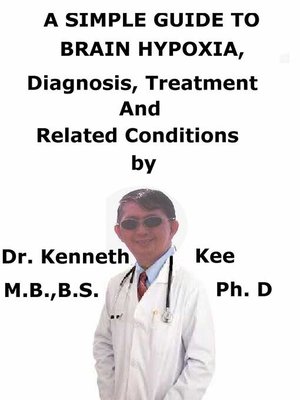
Sign up to save your library
With an OverDrive account, you can save your favorite libraries for at-a-glance information about availability. Find out more about OverDrive accounts.
Find this title in Libby, the library reading app by OverDrive.



Search for a digital library with this title
Title found at these libraries:
| Library Name | Distance |
|---|---|
| Loading... |
This book describes Brain Hypoxia, Diagnosis and Treatment and Related Diseases
Brain hypoxia is when the brain is not receiving enough oxygen.
This can happen when someone is drowning, choking, suffocating, or in cardiac arrest.
Brain injury, stroke, and carbon monoxide poisoning are other possible sources of brain hypoxia.
The disorder can be serious because brain cells need an uninterrupted flow of oxygen to function properly.
Hypoxia indicates low levels of oxygen in the body's tissues.
Hypoxemia indicates low levels of oxygen in the blood.
While both hypoxia and hypoxemia can happen separately, they often happen together since when there is low blood oxygen, the blood cannot supply sufficient oxygen to the body's tissues.
Hypoxia is often used to depict both low oxygen in the body's tissues and low blood oxygen.
What are the causes of brain hypoxia?
Causes
There are many medical disorders and events that interrupt the flow of oxygen to the brain.
Stroke, cardiac arrest, and an irregular heartbeat can prevent oxygen and nutrients from moving to the brain.
Other possible causes of oxygen depletion are:
1. Hypotension, which is extremely low blood pressure
2. Anesthesia complications during surgery
3. Choking
4. Carbon monoxide poisoning
5. Drowning
6. Breathing in carbon monoxide or smoke
7. Traveling to high altitudes (above 8,000 feet)
8. Brain injury
9. Strangulation
10. Medical disorders that make it hard to breathe, such as severe asthma attacks
Causes of hypoxia are:
1. Severe asthma attack
2. Lung damage due to trauma
3. Chronic obstructive pulmonary diseases (COPD) including emphysema and chronic bronchitis
4. Pneumonia
5. COVID-19
6. Pulmonary edema (fluid in the lungs)
7. Pulmonary embolism (blood clot in the lungs)
8. Pneumothorax (collapsed lung)
9. Acute respiratory distress syndrome (ARDS)
10. Pulmonary fibrosis (scarred and damaged lungs)
11. Heart problems
12. Anemia
13. Certain pain medications and other drugs that can depress breathing, such as narcotics and anesthetics
14. Cyanide poisoning
15. Interstitial lung disease
16. Sleep apnea
17. Obesity-hypoventilation syndrome
18. Being at high altitudes
Who is at risk for brain hypoxia?
Anyone who develops an event where they are not getting enough oxygen is at risk for brain hypoxia.
1. If the work or regular activities involve situations that deprive the patient of oxygen, the risk is higher.
2. Sports and hobbies
3. Taking part in sports where head injuries are frequent, such as boxing and football, also places the patient at risk for brain hypoxia.
4. Swimmers and divers who hold their breaths for long periods of time are also susceptible.
5. Mountain climbers are at risk as well.
6. Medical conditions
The patient is at risk if the patient has a medical disorder that limits the transfer of oxygen to the brain.
These disorders are:
1. Amyotrophic lateral sclerosis (ALS), a degenerative disease involving the nerves in the brain and spinal cord.
ALS can cause weakness of the breathing muscles.
2. Hypotension
3. Asthma
Brain hypoxia necessitates immediate treatment to restore the flow of oxygen to the brain.
For a mild case produced by mountain climbing, the patient would immediately return to a lower altitude.
In more serious cases, the patient needs emergency care that places the patient on a ventilator (breathing machine).
TABLE OF CONTENT
Introduction
Chapter 1 Brain...







